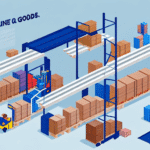Overcoming Obstacles to Achieve Logistics Sustainability
Logistics sustainability is essential for businesses aiming to meet current demands without compromising the ability of future generations to do the same. Maximizing capacity is a key component in achieving this sustainability. However, businesses often face challenges that impede their efforts. This article explores effective strategies to overcome these challenges and enhance capacity for sustainable logistics operations.
Maximizing Capacity for Enhanced Productivity
Implementing Automation
Automation plays a pivotal role in increasing productivity without sacrificing quality. By automating repetitive tasks, businesses can reduce operational time and allow employees to focus on more complex and value-added activities. According to a McKinsey report, automation can increase productivity by up to 30% in certain industries.
Expanding into New Markets
Entering new markets, whether regional or international, can significantly increase a company's customer base and overall capacity. This expansion creates new revenue streams and diversifies market risks, contributing to sustainable growth.
Investing in Employee Training
Providing comprehensive training and development programs ensures that employees possess the necessary skills to perform efficiently. Well-trained staff can enhance operational effectiveness, leading to higher productivity and capacity.
Adopting Lean Management Practices
Lean management focuses on eliminating waste and optimizing processes. By continuously refining operations and removing non-value-added activities, businesses can achieve greater efficiency and increased capacity. The Lean Enterprise Institute highlights the benefits of lean practices in improving organizational performance.
Capacity Planning for Sustainable Growth
Forecasting Future Demand
Accurate demand forecasting is crucial for aligning capacity with future business objectives. By analyzing market trends and historical data, companies can predict future needs and allocate resources accordingly.
Resource Optimization
Effective capacity planning involves optimizing the use of existing resources such as labor, equipment, and materials. This optimization helps in minimizing waste and reducing costs while maintaining high-quality standards.
Scalable Infrastructure
Investing in scalable infrastructure ensures that businesses can adjust their capacity in response to fluctuating demand. Flexible systems and processes facilitate smooth scaling operations without significant disruptions.
Streamlining Procurement Processes
Centralizing Procurement Activities
Centralizing procurement activities creates a unified approach to purchasing, reducing duplication and errors. A centralized system enhances transparency and improves supplier management.
Leveraging Technology in Procurement
Utilizing procurement software can automate tasks such as purchase order creation and invoice processing. This automation not only saves time but also minimizes the risk of errors. Additionally, real-time data analytics provided by these tools enable informed decision-making.
Negotiating Favorable Supplier Contracts
Negotiating better terms with suppliers, including volume discounts and favorable payment terms, can significantly reduce procurement costs. Building strong relationships with suppliers also facilitates better negotiation outcomes.
Building Strong Supplier Relationships
Effective Communication
Clear and consistent communication with suppliers is essential for maintaining strong relationships. Setting clear expectations regarding delivery times, quality standards, and payment terms ensures smooth operations.
Timely Payments
Paying suppliers on time demonstrates reliability and fosters trust. Reliable payment practices can lead to better terms and stronger partnerships.
Collaborative Improvement
Engaging suppliers in continuous improvement initiatives helps identify areas for enhancement in the procurement process. Collaborative efforts can lead to innovations that benefit both parties.
Reducing Costs Without Compromising Quality
Optimizing the Supply Chain
Analyzing and refining supply chain processes can identify cost-saving opportunities without affecting product quality. Streamlined supply chains enhance efficiency and reduce operational costs.
Investing in Sustainable Practices
Adopting sustainable practices, such as using energy-efficient equipment and reducing waste, can lower costs while benefiting the environment. Sustainable initiatives often lead to long-term savings and improved corporate reputation.
Outsourcing Non-Core Functions
Outsourcing tasks like payroll processing or customer service to specialized providers can reduce costs and allow businesses to focus on their core competencies. This strategy ensures efficiency without compromising service quality.
Effective Vendor Negotiation Strategies
Understanding Vendor Offerings
Thoroughly understanding the products or services offered by vendors and their competitive landscape provides leverage during negotiations. Informed negotiation can result in better pricing and terms.
Building Rapport with Vendors
Establishing a positive relationship with vendors can facilitate more productive negotiations. Mutual respect and understanding create a collaborative environment for achieving favorable agreements.
Research and Preparation
Conducting comprehensive research on vendors' reputations, pricing models, and industry trends equips businesses with the necessary information to negotiate effectively from a position of strength.
Conclusion
Maximizing capacity is integral to achieving logistics sustainability. By implementing strategies such as automation, market expansion, employee training, and lean management, businesses can overcome obstacles and enhance their capacity. Effective capacity planning, streamlined procurement processes, strong supplier relationships, cost reduction without sacrificing quality, and strategic vendor negotiations further contribute to sustainable growth. Balancing capacity optimization with sustainable practices ensures that businesses not only grow but do so responsibly, safeguarding resources for future generations.
For more insights on logistics sustainability and capacity maximization, refer to industry reports from sources like the Supply Chain Digital and the APICS.






















